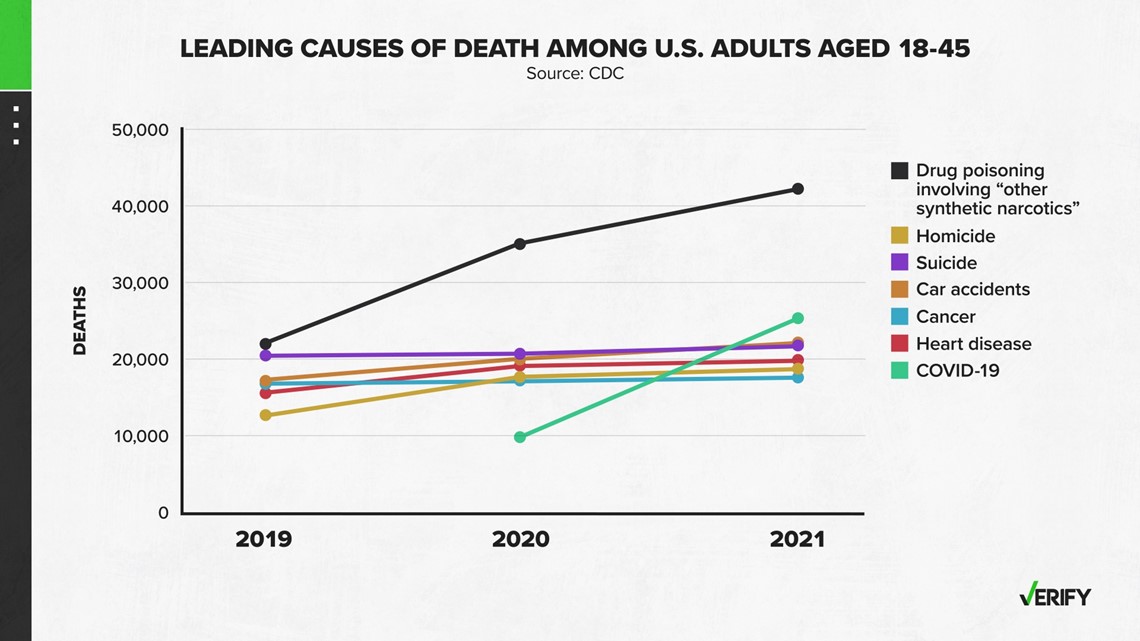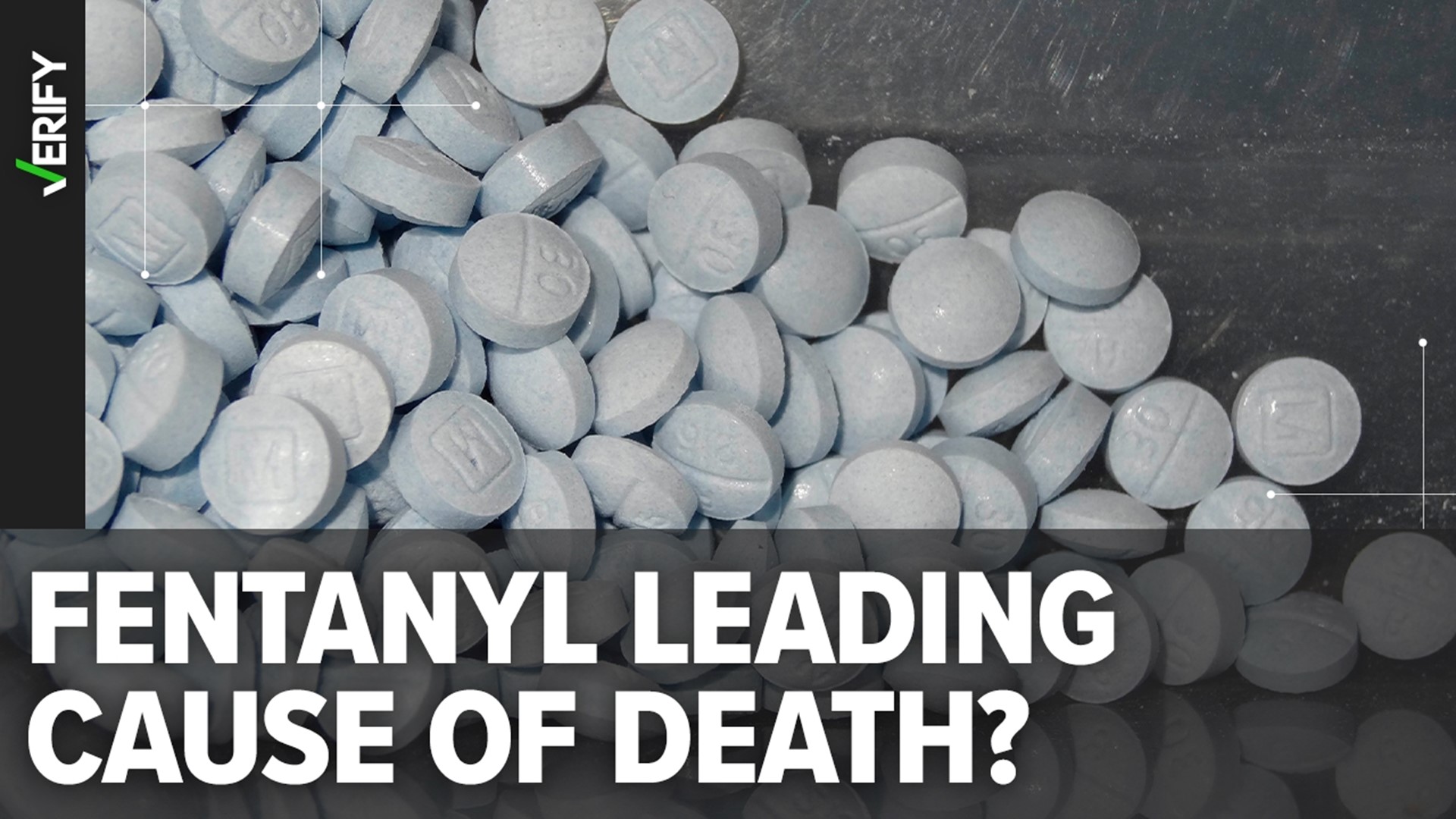Fentanyl is a powerful synthetic opioid typically used to treat patients with severe pain, especially after surgery. But it is also made and used illegally as a recreational drug, according to the National Institute on Drug Abuse.
For the past few years, several people on social media, including House Speaker Kevin McCarthy (R-Calif.), U.S. Rep Beth Van Duyne (R-Texas) and Gov. Gregg Abbott (R-Texas), have claimed fentanyl is the leading cause of death among American adults between the ages of 18 and 45. Online searches show many people are wondering if this claim is true.
THE QUESTION
Is fentanyl the leading cause of death among American adults between the ages of 18 and 45?
THE SOURCES
- U.S. Centers for Disease Control and Prevention (CDC)
- National Center for Health Statistics (NCHS)
- National Institute on Drug Abuse
- Families Against Fentanyl
- Brian Tsai, spokesperson for the CDC’s National Center for Health Statistics
THE ANSWER
This claim needs context. In the U.S., unintentional injuries are the official leading cause of death for American adults in the 18 to 45 age group. That category includes accidental drug overdose deaths due to the use of synthetic opioids, like fentanyl.
However, the U.S. Centers for Disease Control and Prevention (CDC) told VERIFY it does not track the exact number of fentanyl deaths for that specific age group, so the agency cannot say for certain that the viral claim is accurate, and there are no other comprehensive reports available in the U.S.
WHAT WE FOUND
A 2021 Families Against Fentanyl report claims fentanyl poisoning is the leading cause of death among American adults between the ages of 18 and 45 years old. The CDC, which is the only federal agency that collects cause of death data in the U.S., does not track the exact number of fentanyl deaths for that age group and cannot confirm whether the claim is true.
In the United States, the top five leading causes of death for all Americans are heart disease, cancer, COVID-19, unintentional injuries (accidents) and stroke, according to 2021 U.S. mortality data from the CDC’s National Center for Health Statistics (NCHS).
But for Americans between the ages of 18 and 45, the CDC says unintentional injuries are the leading cause of death. Unintentional injury deaths include accidental drug overdoses, motor vehicle crashes and unintended falls. In 2021, 87,736 individuals in the 18 to 45 age group died of unintentional injuries. Nearly half (48,344) of those deaths were accidental drug overdoses, according to CDC data.
Synthetic opioids other than methadone, like tramadol and fentanyl, are the most common narcotics involved in U.S. drug overdose deaths among all age groups, according to the CDC. In 2021, 42,678 drug overdose deaths involving synthetic opioids other than methadone were reported in the U.S. among the 18 to 45 age group. The CDC says most of those deaths primarily involved illicitly manufactured fentanyl but did not provide an exact number.
The widely shared claim circulating on social media cites information found in a Families Against Fentanyl report from 2021. Families Against Fentanyl is a nonprofit dedicated to raising awareness of the threat posed by illicit fentanyl.
In December 2021, Families Against Fentanyl conducted an analysis of accidental drug overdose death data from 2019 and 2020 using the CDC Wonder database. They concluded that fentanyl poisoning is the leading cause of death among American adults aged 18 to 45, surpassing suicide, COVID-19 and car accidents.
VERIFY attempted to recreate Families Against Fentanyl’s analysis using the CDC’s Wonder and WISQARS databases. We found that in 2020 unintentional injuries accounted for 78,191 deaths among individuals in the 18 to 45 age group. Drug overdose deaths involving a variety of narcotics, such as heroin and cocaine, topped the unintentional injuries list for that age group with nearly 50,000 deaths reported in 2020.
We also found that 35,234 of those nearly 50,000 drug overdose deaths can be attributed to the use of “other synthetic narcotics,” which includes opioids like fentanyl. This number is higher than all other categories that the CDC identifies as a cause of death. In the same year, there were 21,424 suicide deaths, 20,091 car accident deaths, 18,878 heart disease deaths, 17,332 homicide deaths, 17,169 cancer deaths and 9,847 COVID-19 deaths reported among adults aged 18 to 45.
In 2019, unintentional injuries accounted for 60,973 deaths among those in the 18 to 45 age group, with drug overdoses leading that list as well with nearly 37,000 reported deaths. Approximately 22,187 of those deaths can also be attributed to the use of “other synthetic narcotics,” such as fentanyl, surpassing the 21,195 suicide deaths, 17,325 car accident deaths, 17,143 cancer deaths, 16,435 heart disease deaths and 13,084 homicide deaths reported in 2019 for those aged 18 to 45 years old.


Our analysis of the CDC data determined that the leading cause of death for 18 to 45-year-olds in 2019 and 2020 can be attributed to overdoses from “other synthetic narcotics.” But the CDC data does not break down that category to show how many of those deaths are exclusively attributed to fentanyl.
VERIFY reached out to the CDC to confirm whether it considers fentanyl poisoning to be the leading cause of death among adults in the 18 to 45 age group like the Families Against Fentanyl report alleges.
In an email, Brian Tsai, an NCHS spokesperson, said that specific drug categories are not included in the CDC’s official leading causes of death rankings. He also said that the agency does not track the exact number of fentanyl deaths in the 18 to 45 age group.
“Fentanyl falls into a broader category ‘other synthetic narcotics.’ Previous work has shown that fentanyl comprises approximately 90% of that category overall, but we do not have an exact count of fentanyl deaths,” Tsai told VERIFY.
“If one assumes that the other synthetic narcotics category for those 18-45 is 90% fentanyl, then one can argue that unintentional fentanyl overdose is likely the leading cause in that age group. However, because we don’t have exact numbers of fentanyl deaths for that age category, we cannot say for certain that this is accurate,” Tsai added.
VERIFY contacted Families Against Fentanyl for comment but did not hear back by the time of publication.












